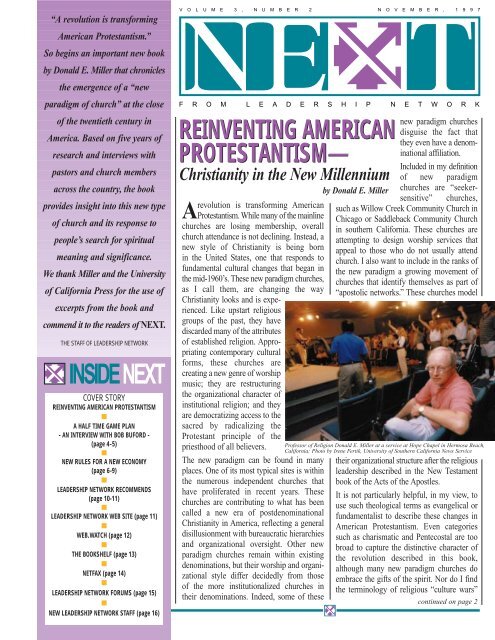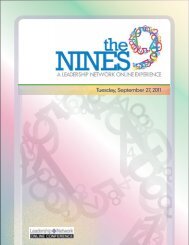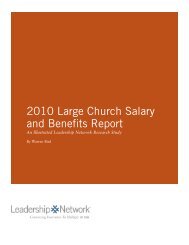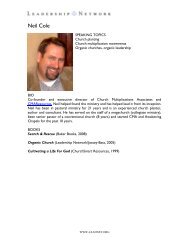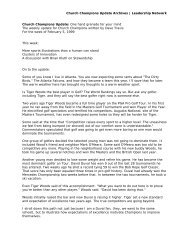ARE WE A PEOPLE AT HALF TIME? - Leadership Network
ARE WE A PEOPLE AT HALF TIME? - Leadership Network
ARE WE A PEOPLE AT HALF TIME? - Leadership Network
You also want an ePaper? Increase the reach of your titles
YUMPU automatically turns print PDFs into web optimized ePapers that Google loves.
“A revolution is transforming<br />
American Protestantism.”<br />
So begins an important new book<br />
by Donald E. Miller that chronicles<br />
the emergence of a “new<br />
paradigm of church” at the close<br />
of the twentieth century in<br />
America. Based on five years of<br />
research and interviews with<br />
pastors and church members<br />
across the country, the book<br />
provides insight into this new type<br />
of church and its response to<br />
people’s search for spiritual<br />
meaning and significance.<br />
We thank Miller and the University<br />
of California Press for the use of<br />
excerpts from the book and<br />
commend it to the readers of NEXT.<br />
THE STAFF OF LEADERSHIP NETWORK<br />
INSIDE NEXT<br />
COVER STORY<br />
REINVENTING AMERICAN PROTESTANTISM<br />
■<br />
A <strong>HALF</strong> <strong>TIME</strong> GAME PLAN<br />
- AN INTERVIEW WITH BOB BUFORD -<br />
(page 4-5)<br />
■<br />
NEW RULES FOR A NEW ECONOMY<br />
(page 6-9)<br />
■<br />
LEADERSHIP NETWORK RECOMMENDS<br />
(page 10-11)<br />
■<br />
LEADERSHIP NETWORK <strong>WE</strong>B SITE (page 11)<br />
■<br />
<strong>WE</strong>B.W<strong>AT</strong>CH (page 12)<br />
■<br />
THE BOOKSHELF (page 13)<br />
■<br />
NETFAX (page 14)<br />
■<br />
LEADERSHIP NETWORK FORUMS (page 15)<br />
■<br />
NEW LEADERSHIP NETWORK STAFF (page 16)<br />
V O L U M E 3 , N U M B E R 2 N O V E M B E R , 1 9 9 7<br />
F R O M L E A D E R S H I P N E T W O R K<br />
REINVENTING AMERICAN<br />
PROTESTANTISM—<br />
Christianity in the New Millennium<br />
by Donald E. Miller<br />
Arevolution is transforming American<br />
Protestantism. While many of the mainline<br />
churches are losing membership, overall<br />
church attendance is not declining. Instead, a<br />
new style of Christianity is being born<br />
in the United States, one that responds to<br />
fundamental cultural changes that began in<br />
the mid-1960’s. These new paradigm churches,<br />
as I call them, are changing the way<br />
Christianity looks and is experienced.<br />
Like upstart religious<br />
groups of the past, they have<br />
discarded many of the attributes<br />
of established religion. Appropriating<br />
contemporary cultural<br />
forms, these churches are<br />
creating a new genre of worship<br />
music; they are restructuring<br />
the organizational character of<br />
institutional religion; and they<br />
are democratizing access to the<br />
sacred by radicalizing the<br />
Protestant principle of the<br />
priesthood of all believers.<br />
The new paradigm can be found in many<br />
places. One of its most typical sites is within<br />
the numerous independent churches that<br />
have proliferated in recent years. These<br />
churches are contributing to what has been<br />
called a new era of postdenominational<br />
Christianity in America, reflecting a general<br />
disillusionment with bureaucratic hierarchies<br />
and organizational oversight. Other new<br />
paradigm churches remain within existing<br />
denominations, but their worship and organizational<br />
style differ decidedly from those<br />
of the more institutionalized churches in<br />
their denominations. Indeed, some of these<br />
new paradigm churches<br />
disguise the fact that<br />
they even have a denominational<br />
affiliation.<br />
Included in my definition<br />
of new paradigm<br />
churches are “seekersensitive”<br />
churches,<br />
such as Willow Creek Community Church in<br />
Chicago or Saddleback Community Church<br />
in southern California. These churches are<br />
attempting to design worship services that<br />
appeal to those who do not usually attend<br />
church. I also want to include in the ranks of<br />
the new paradigm a growing movement of<br />
churches that identify themselves as part of<br />
“apostolic networks.” These churches model<br />
Professor of Religion Donald E. Miller at a service at Hope Chapel in Hermosa Beach,<br />
California; Photo by Irene Fertik, University of Southern California News Service<br />
their organizational structure after the religious<br />
leadership described in the New Testament<br />
book of the Acts of the Apostles.<br />
It is not particularly helpful, in my view, to<br />
use such theological terms as evangelical or<br />
fundamentalist to describe these changes in<br />
American Protestantism. Even categories<br />
such as charismatic and Pentecostal are too<br />
broad to capture the distinctive character of<br />
the revolution described in this book,<br />
although many new paradigm churches do<br />
embrace the gifts of the spirit. Nor do I find<br />
the terminology of religious “culture wars”<br />
continued on page 2


